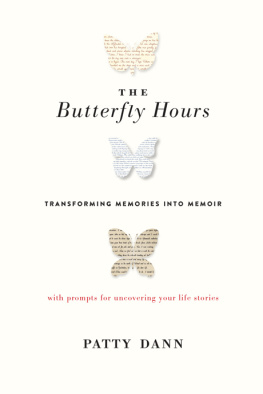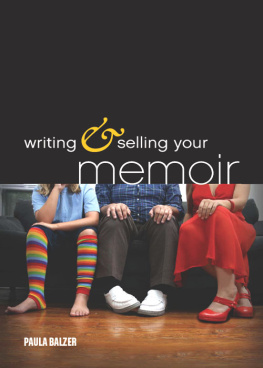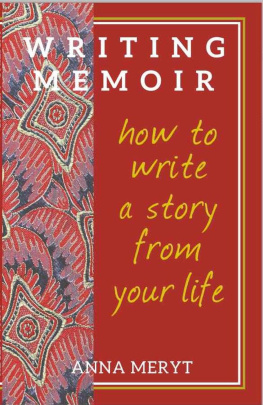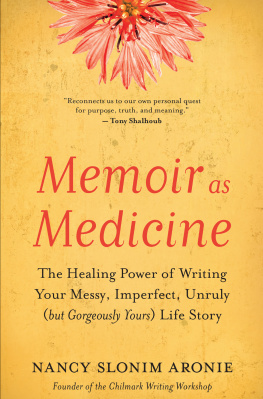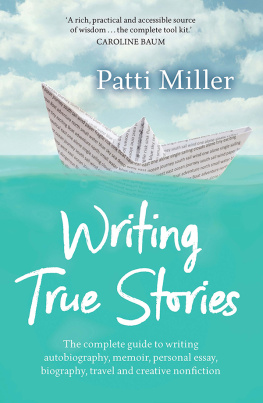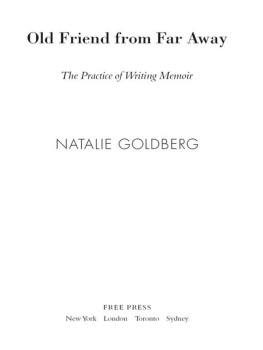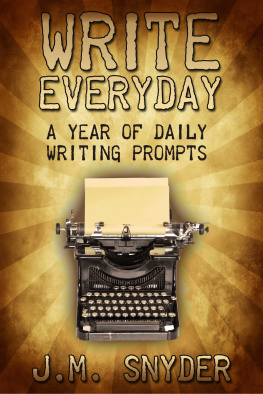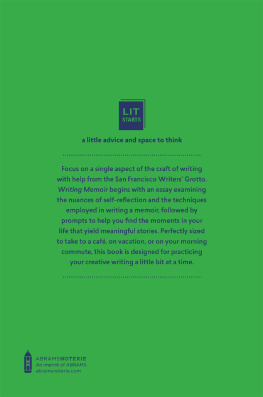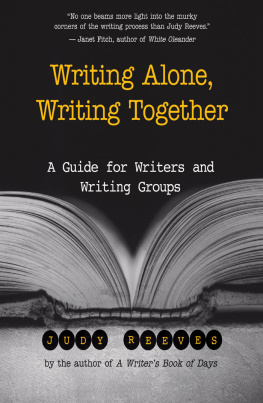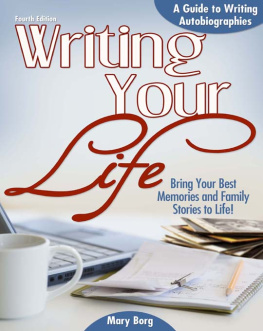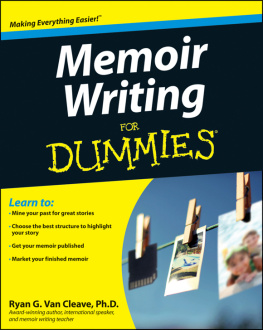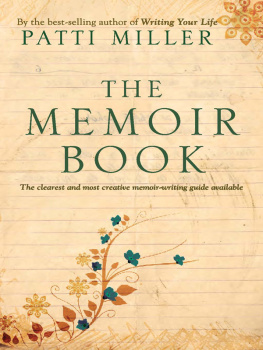Sign up to receive news and special offers from Shambhala Publications.

Or visit us online to sign up at shambhala.com/eshambhala.
THE
Butterfly Hours
TRANSFORMING MEMORIES INTO MEMOIR

PATTY DANN

SHAMBHALA
Boulder 2016
Authors Note: The names and certain identifying features of some people portrayed in this book have been changed to protect their privacy.
Shambhala Publications, Inc.
4720 Walnut Street
Boulder, Colorado 80301
www.shambhala.com
2016 by Patty Dann
Cover design by Jim Zaccaria
All rights reserved. No part of this book may be reproduced in any form or by any means, electronic or mechanical, including photocopying, recording, or by any information storage and retrieval system, without permission in writing from the publisher.
LIBRARY OF CONGRESS CATALOGING-IN-PUBLICATION DATA
Names: Dann, Patty, author.
Title: The butterfly hours: transforming memories into memoir / Patty Dann.
Description: First edition. | Boulder: Shambhala, 2016.
Identifiers: LCCN 2015044685 | EISBN 9780834840348 | ISBN 9781611802887 (paperback: acid-free paper)
Subjects: LCSH: AutobiographyAuthorship. | Biography as a literary form. | Narration (Rhetoric) | BISAC: LANGUAGE ARTS & DISCIPLINES / Composition & Creative Writing. | SELF-HELP/ Creativity.
Classification: LCC CT25 .D367 2016 | DDC 808.06/692dc23
LC record available at http://lccn.loc.gov/2015044685
For my students,
who are my teachers
I HAVE TAUGHT memoir writing to butchers, bakers, and candlestick makers who hail from Brooklyn, Sioux Falls, and Beirut. My students have survived wars and marriages; they have crossed deserts, oceans, and centuries. But in this time of tell all and tell everybody, I still meet people who have kept secrets for fifty years. After several decades of my listening to their tales, they have given me the courage to begin to tell my own, not a wild and shocking story, but the small story of my life on earth.
When I started teaching memoir writing workshops at the YMCA, I heard stories from a woman who hid in a cellar eating tulip bulbs as the Nazis marched overhead and from a frail man who learned to read from soup cans in an internment camp in California. Now I hear stories from a woman whose mother labored in a Barbie factory in Hong Kong, from the last surviving son of a farming family in West Texas, and from a woman from Ecuador who remembers the taste of Tabasco sauce that was used on her mothers breast to push her aside for the next baby on the way.
What began as a way to help my students uncover their stories evolved into a parallel quest I started when my first husband, Willem, became sick with brain cancer. He was Dutch and knew many languages, but as he began to lose more words every day, he whispered to me, Lieveling, we have to remember the butterfly hours. English wasnt his first language, and he called pinecones pineapples, so I cannot say I understood completely, but I was entirely sure what he meant.
For years I had little interest in true life books, as my son used to call nonfiction. But at each step through the storms in the world, I have found myself writing more and more true life. I took a taste of my own cookie dough, as Willem used to say, and began to do the memory exercises from my workshops myself.
Now each day I do the same assignments I give my students, one-word memory triggers like Table or Car, with time to saunter in the woods, as Thoreau would say. These assignments are a way to stitch together the patches of my life.
Ive now taught my workshop at the YMCA for more than twenty-five years. The class description reads:
Lifestories: For people who want to write about their childhood as well as their more recent past. Whether you are a published writer or last wrote in a diary long ago, you are welcome in this class. Mark Twain said, The difference between the almost right word and the right word is the difference between lightning and a lightning bug. Finding the right word is the goal of this workshop. Suggested weekly assignments will be given to help trigger memories.
The class is as basic as writing your story and then reading it aloudas simple as writing in invisible ink made from lemon juice, then holding it to a flame to read the words. When you write about a memory you begin to remember more fragments of your life; when you read it to others you remember even more.
I had one student who took my workshop for fifteen years. Every time I gave the assignment of Kitchen Table, she wrote about when she was three years old and her father set down his glass of wine, left the table, and walked out of the house. She never saw him again, but she remembered the smell of burned coffee grounds in that room. She wrote that story and she read it aloud each time she did the assignment, and each time it was different. Each time she added more details, and the last time she wrote that story she read a line she had never written before. She wrote, It is only later that I learned that the man at the table when I was three years old was not my father at all, but my mothers lover. My father had died the year before.
I never learned how much later she learned this truth, but it was in the writing and the rewriting and the reading aloud, year after year after year, that she was able to get to what had happened that night, like when one sings a song over and over, until finally the pitch is right.
It is what happens when two friends walk each other home telling stories far into the night. It is as easy and as difficult as, Hear my story. Once upon a time...

In this book I offer the ten lessons that have rung true with me through every season of writing. Within each of those chapters are various assignments using concrete writing prompts, often just one word, to help trigger a memory. With each assignment, I offer samples of my students writing as well as stories from my own life: a Jewish girl growing up next door to a convent with a father who was a TV executive and a mother who didnt let us watch TV; my marriage to a Dutchman and the adoption of our son from Lithuania; my husbands tragic death and my new marriage to a southerner; and what its like to suddenly be a mother to three sons.
Some of my students are published writers, and for some English is their tentative second language, but they are all transformed by their own words.
The first assignment I ever gave was Food. I left the class as they wrote for ten minutes. After the allotted time, I asked them to read their work aloud. The stories flowed from an Irish painter who wrote about having a hearing aid the size of a cigarette pack when she nursed six babies; a man who told of a parakeet that ate ice cream and spoke French; a woman who hid from Nazis in a barn for an entire winter with only chestnuts to eat. I was enchanted.
Early one morning, a student named Sulyn came to my class before anyone else arrived. Her pale face had fine lines like calligraphy. She had been born in the southwest corner of China. Her felt hat was as wrinkled as her face. She had a sandwich wrapped up in wax paper and secured with a rubber band, which smelled of pickles and fish. She offered me a bite. She broke off a piece, and I almost cried from the fierceness of it.
When class started she read aloud. We had rice balls every day growing up. Some days that is all we ate, and they always tasted a little bit of gunpowder from the firecracker factory where my mother worked. There were five of us girls. Small Happinessthat is what my mother called us. If she had had a boy, that would have been Big Happiness, but all my sisters died. I am here in this class now. I am going to write my head off.
Next page
